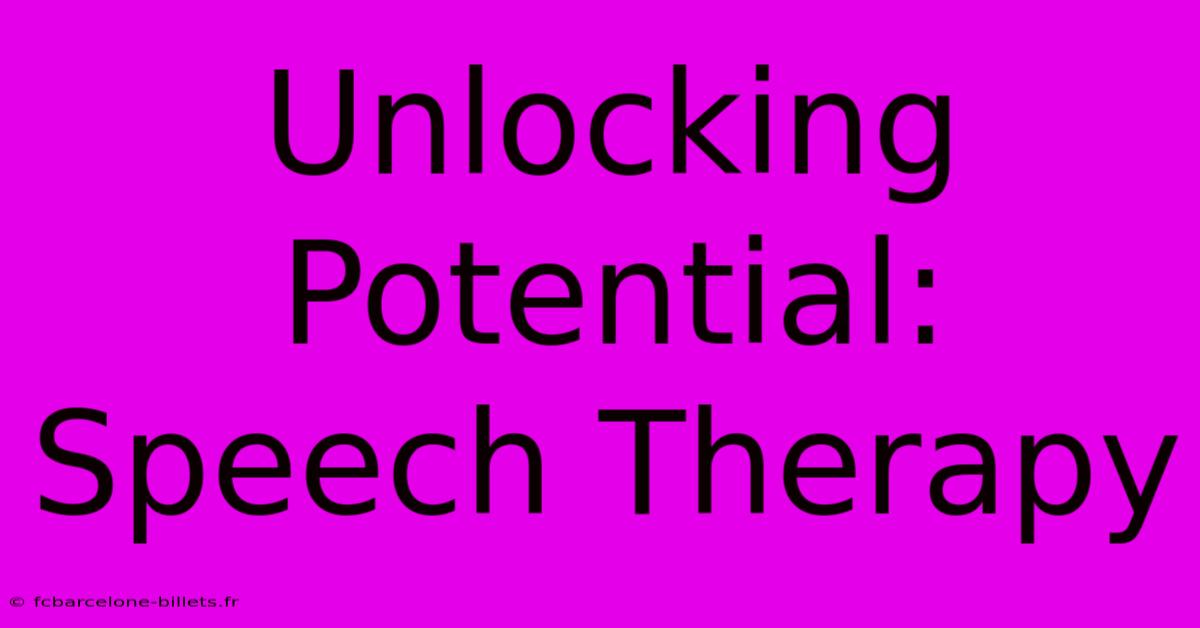Unlocking Potential: Speech Therapy

Table of Contents
Unlocking Potential: Speech Therapy
Speech therapy, also known as speech-language pathology, plays a vital role in helping individuals of all ages overcome communication challenges and unlock their full potential. From toddlers struggling with articulation to adults recovering from strokes, speech therapy offers a pathway to clearer communication and improved quality of life. This comprehensive guide explores the various aspects of speech therapy, its benefits, and who might benefit from its services.
Understanding Speech Therapy: More Than Just Speech
Many people associate speech therapy solely with correcting pronunciation issues. While that's certainly a component, its scope is far broader. Speech therapy encompasses a wide range of communication disorders, including:
- Articulation Disorders: Difficulty producing sounds correctly. This can range from mild lisps to more significant challenges.
- Fluency Disorders (Stuttering): Interruptions in the flow of speech, characterized by repetitions, prolongations, or blocks.
- Language Disorders: Problems with understanding or using language, impacting vocabulary, grammar, and sentence structure. This can affect both receptive (understanding) and expressive (speaking) language skills.
- Social Communication Disorders: Difficulties with social interaction, nonverbal communication, and understanding social cues. This often includes aspects of pragmatic language (using language appropriately in social contexts).
- Voice Disorders: Problems with the quality, pitch, or loudness of the voice. This can stem from vocal cord issues, vocal misuse, or other medical conditions.
- Swallowing Disorders (Dysphagia): Difficulty swallowing food or liquids safely and efficiently. This often requires a collaborative approach with other healthcare professionals.
Who Can Benefit from Speech Therapy?
The truth is, a surprisingly wide range of individuals can benefit significantly from speech therapy. This includes:
- Children: Addressing developmental delays, articulation disorders, language difficulties, and stuttering. Early intervention is key for optimal outcomes.
- Adults: Recovering from strokes, brain injuries, or other neurological conditions that affect communication. Speech therapy helps restore lost skills and improve functional communication.
- Individuals with Autism Spectrum Disorder (ASD): Improving communication skills, social interaction, and reducing challenges with verbal and nonverbal communication.
- Individuals with Down Syndrome: Supporting language development and improving communication abilities.
- Individuals with Apraxia of Speech: A neurological disorder that affects the ability to plan and coordinate the muscle movements necessary for speech.
- Older Adults: Managing age-related communication changes, such as decreased vocal clarity or cognitive-linguistic difficulties.
The Benefits of Speech Therapy: Empowering Communication
The impact of speech therapy extends far beyond simply correcting pronunciation. The benefits are multifaceted and profoundly improve quality of life:
- Improved Communication: This is the most obvious benefit, leading to clearer, more confident, and effective communication.
- Increased Self-Confidence: Overcoming communication challenges boosts self-esteem and reduces anxiety associated with speaking.
- Enhanced Social Interaction: Better communication fosters stronger relationships and improved social participation.
- Academic Success: For children, improved language skills are crucial for academic achievement.
- Improved Quality of Life: The ability to communicate effectively enhances overall well-being and independence.
- Safety: For individuals with swallowing disorders, speech therapy is crucial for preventing choking and aspiration pneumonia.
Finding the Right Speech Therapist: Key Considerations
Choosing a qualified and experienced speech-language pathologist is essential. Look for therapists who:
- Are licensed and certified: Verify their credentials through relevant professional organizations.
- Have experience treating your specific condition: Look for therapists specializing in the type of communication disorder you're facing.
- Use evidence-based practices: Ensure they utilize current research and best practices.
- Are a good fit for you: Build a rapport with the therapist to ensure a comfortable and effective therapeutic relationship.
Unlocking potential through speech therapy is an investment in a brighter, more communicative future. It empowers individuals to overcome obstacles, express themselves fully, and participate actively in all aspects of life. Don't hesitate to seek professional help if you or someone you know is facing communication challenges. Early intervention is often key to maximizing positive outcomes.

Thank you for visiting our website wich cover about Unlocking Potential: Speech Therapy. We hope the information provided has been useful to you. Feel free to contact us if you have any questions or need further assistance. See you next time and dont miss to bookmark.
Featured Posts
-
Amazing Barcelona March Events You Shouldnt Miss
Apr 04, 2025
-
Is Rafael Leao Really Going To Barcelona
Apr 04, 2025
-
Barcelonas Culinary Delights A One Day Itinerary
Apr 04, 2025
-
Miami To Barcelona Shorten Your Travel Time By Sea
Apr 04, 2025
-
Barcelona Trip Blog The Best Time To Visit Barcelona
Apr 04, 2025
